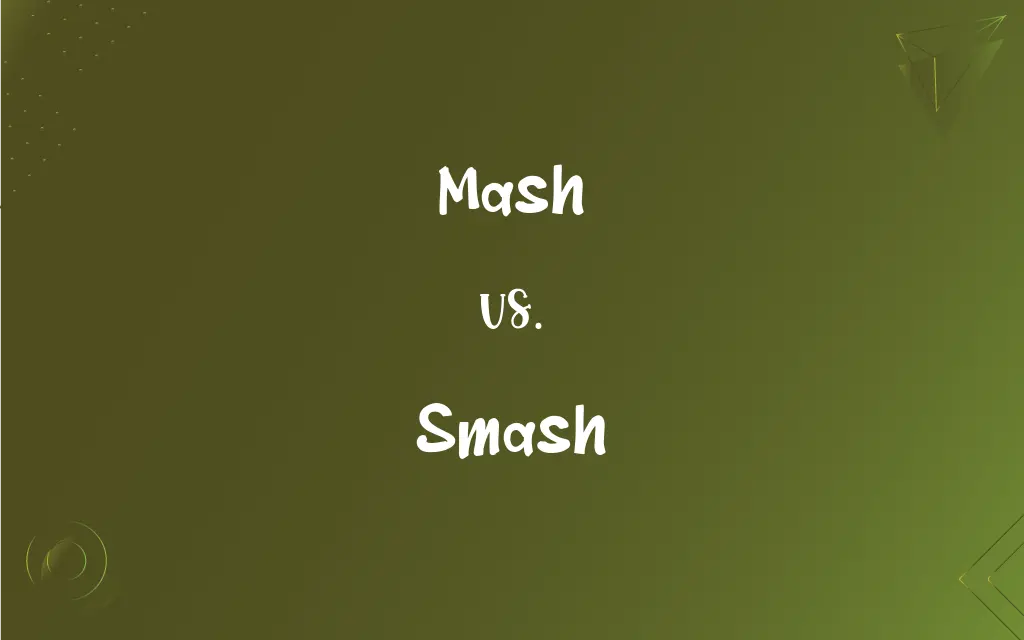Mash vs. Smash: What's the Difference?
Edited by Aimie Carlson || By Harlon Moss || Updated on November 13, 2023
Mash involves crushing into a soft, consistent texture, often for food, while smash means to break something violently into pieces.

Key Differences
Mash typically refers to pressing or crushing something to achieve a soft, uniform consistency, commonly used in cooking, such as mashing potatoes. Smash, on the other hand, implies a more forceful and destructive action, like smashing a window, often resulting in broken pieces.
The act of mashing is generally a controlled, deliberate process aimed at changing texture without destroying the integrity of the item. Smashing is associated with more aggressive, often violent, actions leading to fragmentation or complete breakdown of the object.
Mash is often used in culinary contexts to describe the method of creating a smooth, blended mixture of ingredients. In contrast, smash is used to describe actions in physical or sports contexts, indicating a strong, impactful motion.
The term mash can also imply a gentle, thorough mixing or blending of elements, not necessarily limited to food. Smash, however, often carries a connotation of suddenness and irreversibility, such as in the context of an accident or an act of anger.
Mash suggests a methodical, purposeful action to create a homogeneous mixture, while smash implies a rapid, forceful action resulting in destruction or disintegration.
ADVERTISEMENT
Comparison Chart
Definition
Crushing into a soft, consistent texture.
Breaking something violently into pieces.
Common Use
In cooking, for creating soft, blended food.
In describing forceful destruction or impacts.
Intensity
Gentle and controlled.
Aggressive and forceful.
Outcome
Results in a homogenous mixture.
Results in fragmentation or destruction.
Connotation
Methodical and purposeful.
Sudden and often violent.
ADVERTISEMENT
Mash and Smash Definitions
Mash
To blend ingredients thoroughly.
He mashed the spices together for the marinade.
Smash
To achieve sudden, overwhelming success.
Their new song became a smash hit overnight.
Mash
To crush food into a soft, uniform mixture.
She mashed the bananas to make banana bread.
Smash
To hit or strike with great force.
The tennis player smashed the ball across the court.
Mash
To combine elements to form a consistent whole.
The DJ mashed various tracks to create a new song.
Smash
To crush or flatten with a heavy blow.
She smashed the can with a hammer for recycling.
Mash
A mixture of crushed ingredients, especially food.
The potato mash was perfectly creamy and smooth.
Smash
A forceful blow or hit that causes destruction.
The car crash was a terrible smash.
Mash
To press or squeeze something to change its texture.
She mashed the clay to soften it for sculpting.
Smash
To break something into pieces with force.
He accidentally smashed the vase while playing ball.
Mash
A mixture of malt or other ingredients with water, heated to convert starches into fermentable sugars for use in brewing or distilling.
Smash
To break (something) into pieces suddenly, noisily, and violently; shatter.
Mash
A mixture of ground grain and nutrients fed to livestock and fowl.
Smash
To render (something) into a mush or pulp, as by throwing or crushing
Smashed the tomatoes against the wall.
Mash
A soft pulpy mixture or mass.
Smash
To strike with a heavy blow or impact
The boxer smashed his opponent in the ribs. The bulldozer smashed down the barricade.
FAQs
Does "mash" have other meanings?
In certain contexts, it can refer to a fermenting mixture in brewing or distilling.
Can "mash" mean to mix?
Yes, it can also mean to mix or blend ingredients.
Is "mash" used in cooking?
Yes, it's commonly used in cooking, like in "mashed potatoes."
Are there idioms with "mash"?
Not commonly, it's usually used in its literal sense.
Can "smash" mean to hit or crash?
Yes, it can refer to hitting or crashing with force.
Is "mash" a noun?
It can be, referring to a mashed substance like a potato mash.
Is "mash" used in British English?
Yes, with similar meanings as in American English.
Can "mash" be used metaphorically?
Rarely, but it can imply a messy or confused mixture of ideas.
What's the verb form of "mash"?
"Mashing" is the verb form, as in "mashing potatoes."
What does "mash" mean?
"Mash" typically means to crush or press food or other substances, often until they become a soft, pulpy mass.
Is "smash" used in sports?
Yes, like in tennis for a powerful overhead hit.
Are there idioms with "smash"?
Yes, like "smash hit" for a hugely successful song or movie.
How is "mash" used in brewing?
In brewing, it's the mixture of water and malt before fermentation.
Is "smash" a noun?
It can be, as in "a smash hit" or "a car smash."
Does "smash" have a positive connotation?
It can, especially when referring to success or attractiveness.
What does "smash" mean?
"Smash" means to violently break something into pieces.
Does "smash" have casual uses?
Yes, it can informally mean to achieve great success.
Can "smash" mean to defeat?
Yes, in sports or competitions, it can mean a decisive defeat.
How do you use "smash" in a sentence?
"He smashed the window with a rock."
What's the verb form of "smash"?
"Smashing" is the verb form, as in "smashing a record."
About Author
Written by
Harlon MossHarlon is a seasoned quality moderator and accomplished content writer for Difference Wiki. An alumnus of the prestigious University of California, he earned his degree in Computer Science. Leveraging his academic background, Harlon brings a meticulous and informed perspective to his work, ensuring content accuracy and excellence.
Edited by
Aimie CarlsonAimie Carlson, holding a master's degree in English literature, is a fervent English language enthusiast. She lends her writing talents to Difference Wiki, a prominent website that specializes in comparisons, offering readers insightful analyses that both captivate and inform.






























































